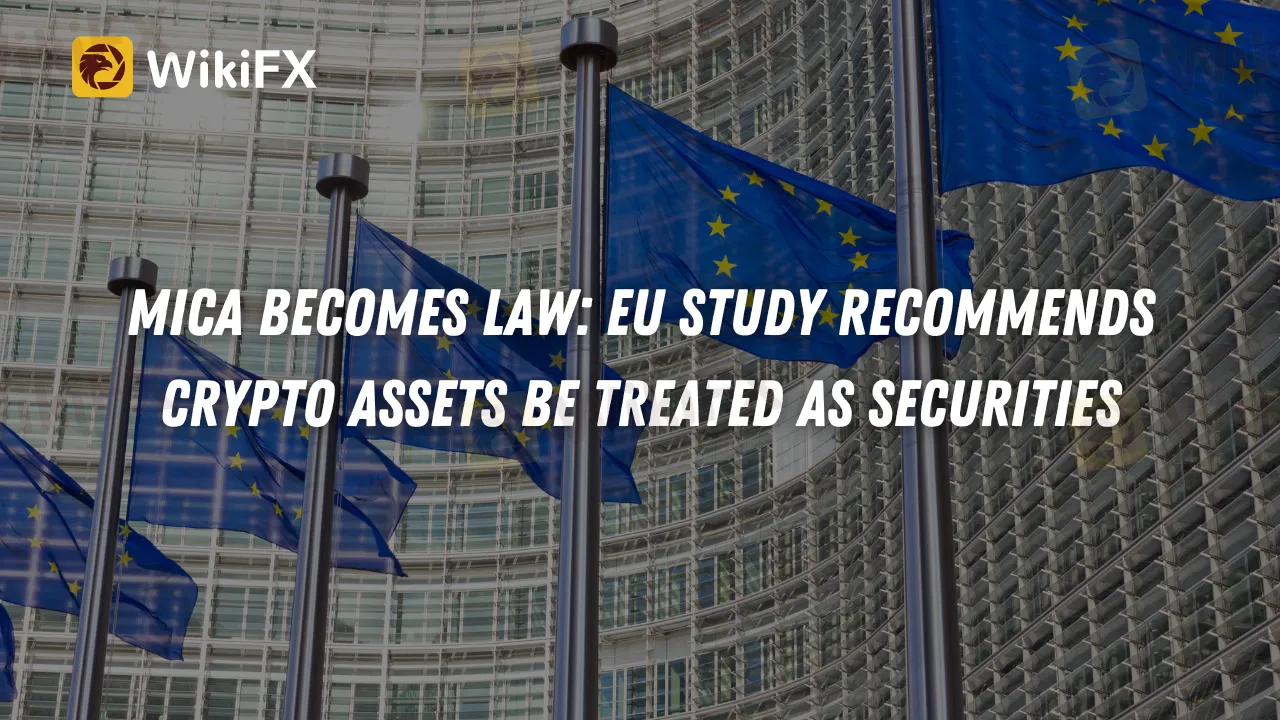简体中文
繁體中文
English
Pусский
日本語
ภาษาไทย
Tiếng Việt
Bahasa Indonesia
Español
हिन्दी
Filippiiniläinen
Français
Deutsch
Português
Türkçe
한국어
العربية
MiCA Becomes Law: EU Study Recommends Crypto Assets Be Treated as Securities
Abstract:The EU has enacted the MiCA regulations, recommending crypto assets be treated as securities. This major step towards crypto regulation could influence global crypto trading and rules.

The European Union (EU) has officially put its foot down on digital currency regulation by enacting the Markets in Crypto-Assets (MiCA) rules, providing a broad-based regulatory framework for the burgeoning crypto industry. The move is accompanied by a study commissioned by the EU Parliament suggesting that the default status of crypto assets should be that of securities, with any deviation from this rule requiring authorization from national authorities.
The completion of MiCA marks a significant step towards more rigorous regulation in the rapidly evolving world of crypto. The study commissioned by the EU Parliament emphasizes the default classification of crypto assets as securities, underscoring the regulatory challenges posed by the swift pace of advancements in the crypto sector and championing a more streamlined method of regulation.
The enforcement of these regulations provides some vindication for Gary Gensler, the Chair of the Securities and Exchange Commission (SEC) in the United States. Gensler, despite facing backlash from the crypto community, has consistently maintained that the majority of crypto tokens should be considered securities. The EU's enforcement of MiCA could potentially serve as a template for the United States to learn from and adapt to its regulatory landscape.
Moreover, U.S. SEC Commissioner Hester Peirce has interpreted the EU's enforcement of MiCA as an insightful learning opportunity for her country. As the regulatory environment for crypto assets continues to evolve and transform globally, authorities worldwide are keeping a vigilant eye on these changes, aiming to ascertain the most effective methods to safeguard investors and maintain market equilibrium.
In light of this advancement, the crypto industry has entered a critical juncture. The EU's MiCA guidelines, accompanied by the proposal to classify crypto assets as securities by default, set the stage for enhanced control and transparency in the digital currency market. This landmark development signals the possibility of a worldwide shift in crypto regulations, with potential implications for how digital currencies are traded and regulated across the globe.
As this new age of crypto regulation dawns, it's imperative for industry stakeholders and investors to stay abreast of the latest news and developments. Ensure you're in the loop by downloading the WikiFX App on your smartphone. Stay informed and navigate the dynamic crypto landscape with ease.
Download the App here: https://social1.onelink.me/QgET/px2b7i8n

Disclaimer:
The views in this article only represent the author's personal views, and do not constitute investment advice on this platform. This platform does not guarantee the accuracy, completeness and timeliness of the information in the article, and will not be liable for any loss caused by the use of or reliance on the information in the article.
Read more

WikiFX "3·15 Forex Rights Protection Day" – Official Release of the Blacklist
WikiFX, as a globally leading forex investment ecosystem service platform, has always been committed to providing fair and authoritative broker verification services for forex investors, while offering solid rights protection support for every victim of forex investment. On February 26, 2025, WikiFX once again launched its annual "3·15 Forex Rights Protection Day" event, aiming to empower forex investors to speak out and defend their rights through open, transparent, and robust means.

California Cracks Down on Crypto Scams: 42 Websites Shut Down in $6.5M Bust
California Attorney General Rob Bonta announced earlier this week that the state had taken decisive action against fraudulent cryptocurrency operations. Authorities successfully shut down 42 scam websites responsible for deceiving investors out of at least $6.5 million.

Nigeria’s Oil and Gas Sector Gains Momentum
Nigeria’s oil and gas industry is experiencing a surge in investment, fueled by policy reforms and international collaboration, paving the way for continued energy expansion.

The Global Tariff War Escalates: Who Suffers the Most?
The global trade war is intensifying as countries continue to raise tariffs, aiming to protect their own economies while creating greater market uncertainty. In this tit-for-tat game, who is truly bearing the brunt?
WikiFX Broker
Latest News
How to Avoid Risks from Scam Brokers in Forex Investment
Will Trump's Trade Policies Fuel Inflation? BlackRock Warns of Economic Risks
WikiFX "3·15 Forex Rights Protection Day" – Official Release of the Blacklist
Why Scammers Let You Win Before Taking It All
A Must-To-Watch Top Trading Pairs This 2025
Currency Calculator






